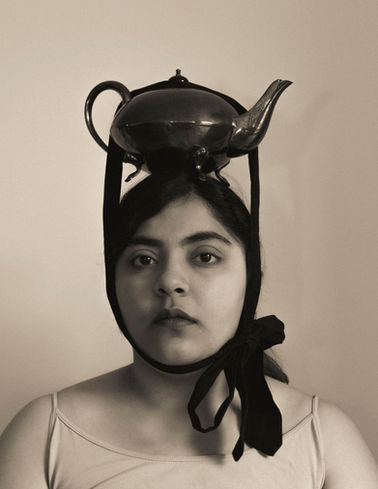Son Chidiya (Golden Bird)
Long before the nuclear and space race, humanity engaged in another global competition: the spice race, the ‘Golden Age of Exploration’. This era, now fading from collective memory, laid the foundations for colonialism, forever altering societies and reshaping their values and identities. The subjugation of the human mind and will mirrored what happened to the land itself. The so-called mission of “civilizing” became synonymous with extracting resources from lands that rightfully belonged to indigenous peoples. To catch up with the world’s consumption demands, colonized societies, and their fragile ecosystems paid a devastating price. The lingering shadow of this imperial past paved the way for modern-day neocolonial practices in a post-colonial world: a dependence on global markets that has fueled the climate crises facing many former colonies, including India, today.
Son Chidiya (Golden Bird) is an ecofeminist self-portrait series that delves into the intertwined narratives of human and environmental exploitation, addressing the role photography has played in shaping ideals of “progress” and “modernization.” With the advent of photography, these ideals have obscured the history of exploitation of resources, marginalisation of indigenous communities and environmental degradation that lies beneath them. In Son Chidiya, I position myself as both the subject and creator, crafting a dialogue between the personal and the historical. As I perform for the camera, I place myself in the shoes of those forgotten and nameless women documented in early colonial photographs and newsreels, unravelling the layers of history that continue to be both visible and hidden from the construct of our minds due to the erasure of history with visual propaganda.
I sat in front of the camera and asked myself to imagine being,
Selected by someone who claims to be your superior.
You don’t know if he means well or not.
He sits you down on a chair, in front of a box-like thing.
You realize you have never been given the privilege of sitting on a chair before.
It was often reserved for men from alien lands and leaders of the tribe,
Men.
The experience itself is alien, but it makes you feel a tiny bit special.
You are confused.
He asks you to look at a black mirror—
A mirror so strange,
You can see your reflection staring back at you like a distorted little bean.
The godman hides behind the box, covering his head with a long black cloth reaching up to his hips,
Like a ghost come to mourn life itself.
In a swift movement, he reaches out for a silver plate and pulls it out.
You are confused and a whole lot terrified now.
He brings your attention back to the mirror,
Your gaze shifts,
Click.
Just like that, he captures a piece of you,
And you,
Have no claim over it.


In all the noise of the world,
We often forget—
Women are the keepers of our roots, bound deeply to the Mother we call Earth.
Heart and spirit intertwined,
We are entrusted with the blessings of ancestors who tilled, nurtured, and sang to this land.
We are the memory keepers of this world,
Bearing the scars of time in our wombs,
As the Earth carries on with history’s wounds.
For what happens to women, happens to the land.
Women endure the same war waged on their bodies as on the land—
Divided, marked, penetrated, and claimed,
Trees felled, as if our souls were stripped bare.
Waters once clean now run poisoned and forgotten, like our dreams and minds cast aside.
If the very soil beneath us is lost, what becomes of the women who carry its memory in their bones?
Reduced to vessels for creation in a capitalist, patriarchal world,
The fire in our bellies smothered, our voices hushed,
As patriarchy stifles our power, Standing on our throats,
Spiritually and emotionally, we are bound here, like rivers winding through sacred grounds,
We are born here, we die here,
For what happens to women, happens to the land.

Son Chidiya (Golden Bird) on display at London College of Communication (UAL), London







